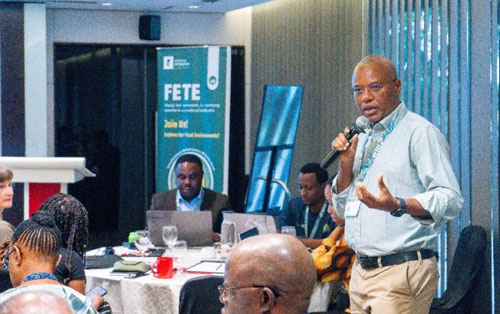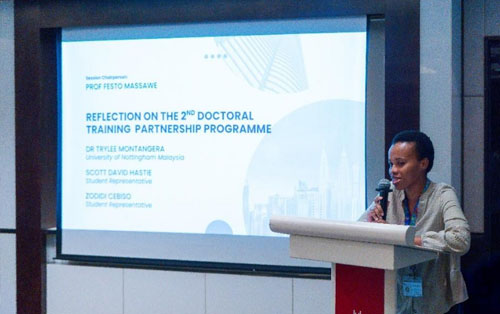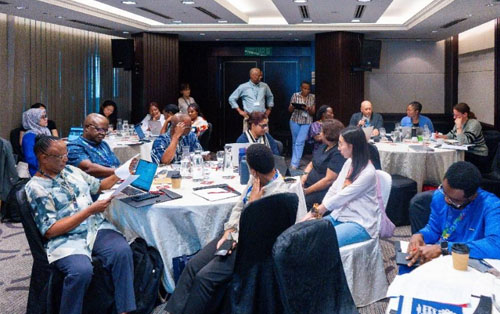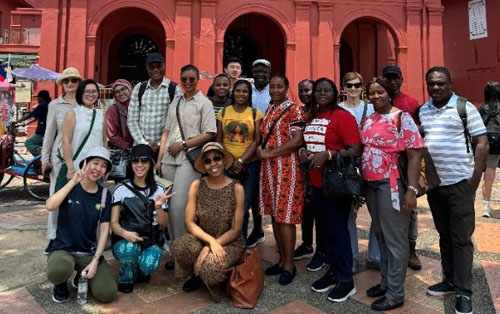FETE Project Partners Gather in Malaysia to Drive Change
From 18 to 20 August 2025, researchers and students from across three continents gathered in Kuala Lumpur for the annual Food Environments in Transitioning Economies (FETE) project workshop. Hosted by the University of Nottingham Malaysia (UNM) at the Grand Millennium Hotel, the event welcomed 33 participants from partner institutions.These included the Science, Technology and Policy Research Institute, Council for Scientific and Industrial Research (CSIR-STEPRI) (Ghana), University of Nottingham Malaysia (Malaysia), University of KwaZulu-Natal (South Africa), and Sokoine University of Agriculture (Tanzania), along with the coordinating team from the Thünen Institute of Market Analysis (Germany).
This year’s workshop stood out not only for its productive sessions but also for the vibrant energy and shared purpose among participants. Eleven postgraduate students, who had previously participated in the project’s Doctoral Training Partnership (DTP) programme, played a central role in the workshop. They shared emerging findings and reflected on the DTP, emphasising how the experience strengthened their critical analysis and communication skills while preparing them to be the next generation of food systems researchers.

Professor Festo Massawe from UNM, lead of the Malaysian consortium partner, shares his insights on the project’s progress and direction

Zodidi Cebiso, a postgraduate student from the University of KwaZulu-Natal, South Africa, reflects on her experience in the DTP programme
Over the three days, teams from each country shared updates on their ongoing fieldwork, data collection efforts, and preliminary insights, facilitating a rich cross-country dialogue. The discussions were open and constructive, with participants exchanging ideas methodological tools,fieldwork challenges and ways to strengthen coherence across research outputs within the FETE network.

A brainstorming session during the FETE Project Annual Workshop 2025
A notable achievement of the workshop was the collaborative effort to align methodologies and refine analytical frameworks. These conversations were key to ensuring that research findings from diverse contexts can be meaningfully compared, contributing to a comprehensive understanding of food environments in transitioning economies. Topics such as dietary patterns, consumer choices, and market dynamics sparked particularly insightful exchanges.
Beyond strengthening current collaboration, the workshop also looked ahead. A highlight was the announcement by the University of KwaZulu-Natal team that the next International Symposium on Food Environments (ISFE) will be held in Pretoria, South Africa, in August 2026. The symposium will provide a global platform for disseminating findings from the FETE research project and engaging with a broader audience of academics, policymakers, and practitioners in food systems and nutrition.
To conclude the workshop on a cultural note, participants travelled to Malacca, a UNESCO World Heritage city celebrated for its historical significance and culinary diversity. The guided tour provided more than sightseeing, it encouraged informal interactions on local food environments, and firsthand experience of the cultural nuances shaping everyday food choices in Malaysia.

Group photo at the Christ Church, a landmark of Malacca’s colonial history
Looking back, the FETE Project Annual Workshop 2025 was more than a space for sharing research, reflection and strategic planning. It was a celebration of collaboration, learning, and shared commitment to change. With strengthen partnerships and clearer pathways forward, the project is well-positioned to deliver research that informs policies and practices for healthier food environments in transitioning economies.
Posted on 3rd October 2025